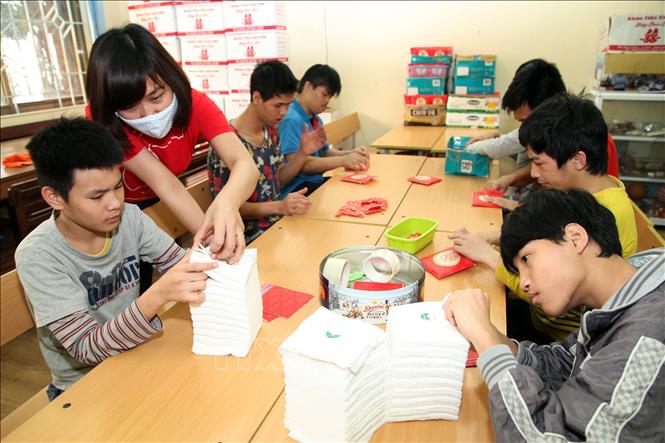What are the types of social support facilities in Vietnam? Who is eligible to receive benefits from a social support facility? - Minh Thuan (Ninh Thuan, Vietnam)

Persons eligible to receive benefits from a social support facility in Vietnam (Internet image)
1. Types of social support facilities in Vietnam
According to Article 5 of Decree 103/2017/ND-CP, types of social assistance establishments include:
- Social protection facilities for caring the elderly.
- Social protection facilities for caring children with special circumstances.
- Social protection facilities for caring people with disabilities.
- Social protection facilities for caring and rehabilitating people with mental health problems.
- General social protection facilities for caring social protection beneficiaries or persons in need of social assistance.
- Social work centers that provide advice or emergency care or social assistance for persons in such need with other necessities.
- Other types of social support facilities as prescribed by laws.
2. Persons eligible to receive benefits from a social support facility in Vietnam
Persons eligible to receive benefits from a social support facility are specified in Article 6 of Decree 103/2017/ND-CP, specifically as follows:
- Social protection beneficiaries as defined in Clause 1 Article 25 of Decree 103/2017/ND-CP;
- Persons in need of emergency protection, including:
= Victims of domestic violence; victims of sexual assaults; trafficking victims; victims of forced labour;
= Children and beggars pending taken to shelters.
- Minors of no fixed address who are liable to compulsory education at communes, wards or commune-level towns in accordance with regulations of the Law on actions against administrative violations 2012, Decree 111/2013/ND-CP, Decree 56/2016/ND-CP.
- Persons other than the social protection beneficiaries mentioned in Clause 1, Clause 2 and Clause 3 of Article 6 of Decree 103/2017/ND-CP, who are in need of social assistance and voluntarily make contributions or have contributions made by their relatives or sponsors (hereinafter referred to as “voluntary beneficiaries”).
- Other beneficiaries under support programs or projects, or decisions by Chairpersons of People’s Committees of provinces or central-affiliated cities.
3. Operating funding of a social support facility in Vietnam
Specifically, in Article 9 of Decree 103/2017/ND-CP, operating funding of a social support facility includes:
- A public social support facility shall have the following sources of funding:
= Funding from state budget;
= Service charges paid by voluntary beneficiaries;
= Revenues from its production and service provision;
= Grants from domestic and foreign organizations and/or individuals;
= Other sources of funding as regulated by law.
- A private social support facility shall have the following sources of funding:
= Its owner's equity;
= Grants from domestic and foreign organizations and/or individuals;
= Service charges paid by voluntary beneficiaries;
= Other sources of funding as regulated by law;
= Funding allocated by state budget to provide social support services.
4. Tasks of a social support facility in Vietnam
According to Article 7 of Decree 103/2017/ND-CP, a social support facility shall perform several or all of the following tasks:
- Provide emergency services, including:
= receive persons in need of emergency protection;
= evaluate the needs of beneficiaries; select and classify beneficiaries. Where necessary, the social support facility shall transfer beneficiaries to health facilities, education institutions, police agencies, judicial agencies or other appropriate agencies or organizations;
= ensure safety and meet certain emergency needs of beneficiaries such as temporary residence, foods, clothes and travel.
- Provide advice and treatment for mental disorder or psychological crisis, and physical rehabilitation for beneficiaries.
- Provide consultancy and assistance for beneficiaries of social support policies; cooperate with relevant agencies and organizations to protect and help eligible beneficiaries; look for and arrange appropriate caring forms.
- Formulate plans to intervene and assist beneficiaries; supervise and review intervention and assistance activities, and then modify such plans.
- Receive, manage, care for, and nurture social protection beneficiaries who face special difficulties, are unable to earn their living as well as live in their families or communities.
- Provide initial medical treatment services.
- Combine rehabilitation and assistance activities for beneficiaries with self-management, cultural, or sports activities and other activities according to age and health status of each group of beneficiaries in accordance with laws.
- Take charge and cooperate with relevant units/ organizations to organize education courses, vocational training courses and/or career-oriented education courses so as to assist beneficiaries in developing their physical strength, understanding and personality as well as getting social inclusion.
- Provide social education and capacity improvement services. To be specific:
= provide social education services to help beneficiaries develop skills in handling situations, including teaching parenting skills to persons in such need, and providing life skills training for children and minors;
= cooperate with education and training institutions to provide training courses in social works for both full-time and part-time social workers or persons working for social work service providers;
= organize training courses or seminars to improve knowledge and skills for beneficiaries in such need.
- Manage beneficiaries of social work services.
- Implement measures to protect beneficiaries from difficult circumstances, assaults, violence or abuse.
- Facilitate community development activities. To be specific:
= contact people and governments at all levels to determine problems in their communities so as to formulate suitable community assistance programs or plans;
= propose community development policies to competent authorities;
= establish the network of social workers and volunteers.
- Organize awareness-raising and communications activities.
- Take charge and cooperate with local government help persons who are qualified to leave the social support facility or voluntarily apply for family reunion and community integration; support and facilitate beneficiaries in stabilizing their life.
- Manage financial sources, assets, officials, public employees and contractual employees in accordance with laws.
- Mobilize and receive financial supports in cash and in kind from domestic and foreign agencies, organizations and/or individuals.
- Provide services at the request of and perform other tasks assigned by competent authorities.
Thanh Rin
- Key word:
- social support facility in Vietnam
 Article table of contents
Article table of contents





.Medium.png)
.Medium.png)
.Medium.png)
.Medium.png)
